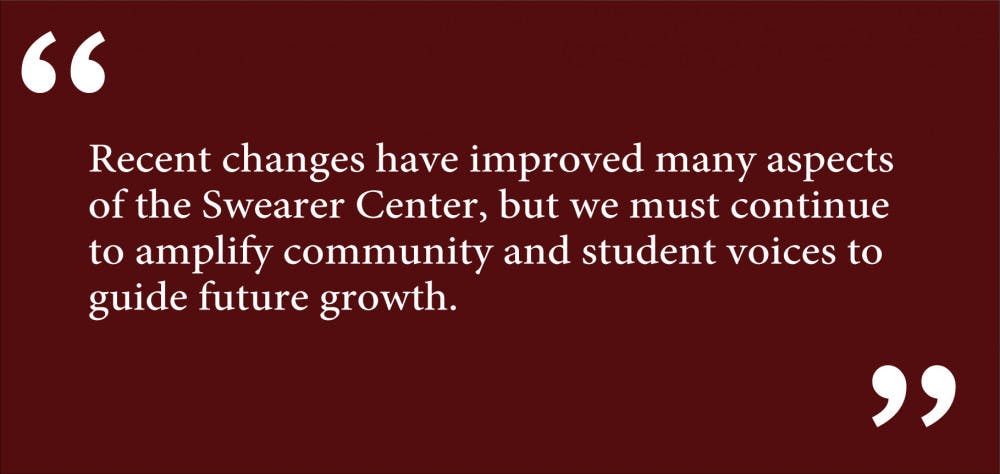Over the past two years, the Swearer Center has undergone dramatic — and even tumultuous — changes: It has transformed its structure, expanded its programming and transitioned to a focus on sustainable change and deep community relationships. This evolution has left some students feeling destabilized, frustrated and ignored. As members of the Swearer Center Student Advisory Committee, we have heard these emotions expressed by our peers and have felt them ourselves as we experienced these changes within the center. But we also feel pride for the Swearer Center’s recent steps forward and excitement for the opportunities that lie ahead.
This semester, the Swearer Center celebrated the 30th anniversary of its founding. In 1986, former University President Howard Swearer created the center to better “prepare young people for responsible citizenship.” As the Swearer Center grew over the decades, its programs expanded to include initiatives connecting thousands of Rhode Island residents with hundreds of student volunteers, as well as support for internships and fellowships around the country and world.
But with more opportunities for students to engage came more variability in the quality of engagement. Irregular student training, constant turnover of student leaders, limited access for students with marginalized identities and a lack of accountability to the community plagued Swearer programming. The old model of service at the Swearer Center put the agency in the hands of students while turning community members into bystanders.
In recent years, the overwhelming focus on student development was understood to be both fiercely outdated and — more vexingly — a continuation of Brown’s imperialist legacy in Providence. The Swearer Center, which stood as a symbol of Brown’s outreach to Providence, was too often acting as a burden on the Providence community by amplifying student interests over community needs.
The Swearer Center’s transformation over the past two years is a direct response to these issues. Its new mission commits the Swearer Center to “transformative learning,” “positive sustainable change” and deep connections between faculty, students and community partners. It has restructured to center community voices, improve the quality of programs and training, prioritize diversity and inclusion and better integrate community engagement throughout the University.
One key change was the shift to a community-focused model of service, in which students work with existing community organizations. This combats the inconsistency of student service by keeping institutional knowledge and decision-making power vested in community members. Though it was not compatible with the decentralized structure of some programs, this model creates more accountable and sustainable programming.
Moreover, students now enter the community with a deeper and more nuanced background in ethical engagement. Swearer staff members have worked extensively with community partners to create a comprehensive and responsive co-curriculum to prepare student volunteers. This ensures a foundational level of ethical practices, contextualizes Brown’s position in Providence and builds community across Swearer programs.
The Swearer Center has also increased the accessibility of community work for all students at Brown through the significantly expanded Off-Campus Federal Work Study funding and more funded internships and fellowships. Another flagship program is the Bonner Fellowship, which provides four-year stipends to low-income students to build long-term relationships with community organizations. Across the Swearer Center, more students than ever before are being compensated for their work at the center and in the community. The new program structures, as well as the new hires, have prioritized increased representation of marginalized groups.
Meanwhile, the center’s focus on engaged scholarship integrates community engagement with Brown’s academic mission. Through the development of the Engaged Scholars Program and the expansion of engaged courses, community partnerships and social justice have become core values of many students’ curricula, departmental course offerings and faculty members’ research. This expansion applies the University’s vast academic resources toward social change.
These changes have improved many aspects of the Swearer Center, but we must continue to amplify community and student voices to guide future growth.
Over the last two years, the Swearer Center has grappled with carrying out a mission centered on community and justice while working within the traditional University power structure. Community voices are prioritized within the Swearer community, but the center itself must be responsive to the Corporation and the Dean of the College. Furthermore, to continue to expand, Swearer leadership must appeal to major donors. The University and Swearer Center have a constant underlying incentive to capitalize off of the Swearer Center’s connections by turning real community relationships into university publicity. Yet that doesn’t negate the very real justice work that staff, students and community partners are able to carry out with the center’s resources. The Swearer community is constantly pushing for more ethical programming and more just structures. Within the bounds of the University, they have created a center that supports effective, ethical, community-oriented social change.
The Swearer Center provides incredible opportunities for positive change. But that change won’t happen unless the entire community — students, the Providence community, faculty and staff — pushes for it. The Student Advisory Committee is one force driving Swearer to stay true to its values, but we’re just 17 students, and we need your continued input and engagement. Give us feedback. Join us on the Student Advisory Committee when applications go live at the end of each semester. If you’re not already part of the Swearer Center community, get involved. As Swearer continues to make the largest changes to its structure since its founding, we need you to stay informed and hold it accountable.
Kai Salem ’18 and Emerson Wells ’18 can be reached at kai_salem@brown.edu and emerson_wells@brown.edu. Thomas Collins ’18 and Kaitlin Sandmann ’17 also contributed. They are writing on behalf of the Swearer Student Advisory Committee, a group of 17 students from both across and outside the Swearer community that advises the Swearer Center’s administration on long-term decisions. Please send responses to this opinion to letters@browndailyherald.com and other op-eds to opinions@browndailyherald.com.



